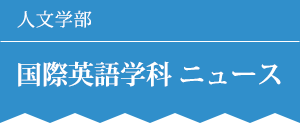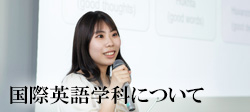This article is the second and final part of a report on the current 4th year GSE students' thesis presentations. We'll hear from four more students who are relieved at having finished their research projects, but who are also excited about their futures. Also, for current and future HJU students, you will have a chance at the end to hear some solid advice from your seniors about how to approach a thesis. First I spoke with AM, whose presentation on homicide in Japan was met with great interest and surprise by everyone who attended the conference.
(GSE生の卒業論文を紹介するウェブニュースの後半です。今回も4人の学生の取り組みとアドバイスをご紹介します。まず一人目は、日本の犯罪について研究したA.M.さんです。)
I wrote my graduation thesis on the topic of understanding and preventing homicide in Japan. This meant understanding motives for killing, current policies, the possibility of new and better solutions, the nature of criminal justice and criminology in this country, and also, the specific issues related to Japan's aging population. These themes guided my research. As I researched and wrote, I began to understand that murder was not something for others to worry about. There are various causes of murder, but in Japan, there are many murders involving close relatives, and domestic problems cause many tragedies. I felt that in order to reduce homicide, it was necessary to approach the problem from various perspectives and find better solutions. I realized that I myself could even become a victim or even a perpetrator. My graduation thesis had a wide range of themes and was a field I had no knowledge of at all, so it was very difficult to read the literature, increase my knowledge, and continue writing. Furthermore, the more I wrote, the less confident I became, sometimes asking myself: "Is the direction right?"; or, "Is this really what I want to write?" However, by choosing an area I was interested in, I felt happy when I made new discoveries, and my desire to write increased. Above all, I feel that having someone to support me when I got stuck sustained me.
(私は「日本の殺人を減らすためにどうすればよいのか」というテーマで卒業論文を書きました。なぜ人は人を殺すのか、そして現在の政策は効果的なのか、よりよい解決策はどのようなことかというのを、犯罪学、刑事司法、そして現在日本社会で問題になっている高齢化に着目し、研究を進めました。この論文を書いていく中で、殺人は他人事ではないと感じるようになりました。殺人の原因は様々ですが、日本では近親間の殺人が多く、家庭内の問題が残酷な悲劇を生んでいます。殺人を減らすためには様々な方面からアプローチし、解決策を見つけていく必要があると感じました。将来自分自身が加害者にも被害者にもなり得るということを心に留め、この問題を考えていきたいです。私の卒業論文はテーマが広い上、全く知識のない分野だったため、文献を読み、知識を増やし、書き進めていくというのが非常に大変でした。さらに、書き進めていくほど、「方向性は合っているのか」、「本当にこれは自分が書きたいことなのか」と自信をなくしていきました。しかし、興味のある分野を選択したことで、新しい発見をした時には嬉しさを感じられ、書きたいという気持ちが大きくなっていきました。そしてなにより、行き詰まった時に支えてくれる人がいた事が自分の糧になったと実感しています。)
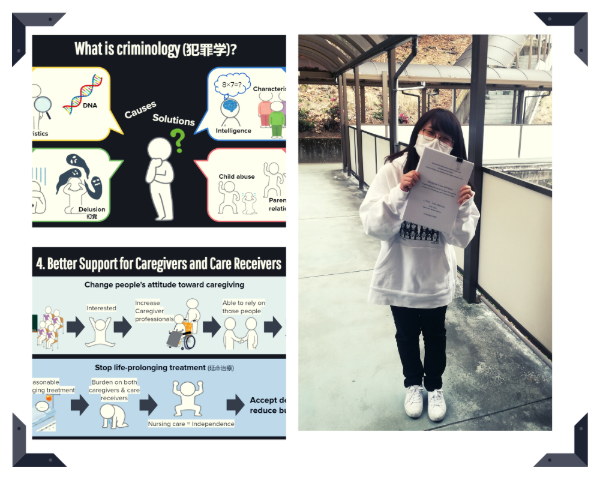
AM: "Having someone to support me when I got stuck sustained me"-HJU's small classes and friendly atmosphere ensure every student gets the support they need.
(A.M.さんのように、少人数制のフレンドリーな雰囲気の中で、全ての学生が丁寧なサポートと指導を受けることができます。)
Next, I spoke with CN. Her topic was quite technical but it made quite the impression on her audience.
(続いて紹介するC.N.さんは、特に専門性の高いテーマに取り組み、周囲を驚かせました。)
I chose "Blockchain Technology and Sustainability Challenges in Japan" as my thesis topic. I examined the potential of blockchain technology, approached the issues facing Japanese society from various angles, and drew my own conclusions. The two years I spent writing my thesis flew by. The last year in particular was a constant battle with myself, as I had to write mainly from home due to the pandemic, and the opportunities to inspire myself through interaction with others were drastically reduced. Creating one big piece of work with all my might at the end of my student life was hard work, but also gave me a great sense of accomplishment when it was completed. I felt that while writing a thesis is primarily an individual activity, it is essential to have friends who share the hardships with you. After graduating from university, I believe that the self-management skills such as motivation and planning that I developed through working on my thesis will surely become the bread and butter of my life.
(私は卒業論文のテーマに「ブロックチェーン技術と日本における持続性の諸課題」を選択しました。新技術であるブロックチェーンの潜在性を吟味し、日本社会が抱える諸課題に様々な角度からアプローチをして、自分なりの結論を導き出しました。執筆にかけた二年間はあっという間でした。特に最後の一年間はパンデミックによって主に在宅で執筆することになり、人との触れ合いを通して自分自身を奮い立たせる機会が激減したことから、常に自分との戦いでもありました。学生生活の最後に全力で一つの大きな作品を作り上げることは大変ではあったものの、完成した時には大きな達成感を感じることができました。卒論を執筆することは、個人プレーを主体としながらも、共に苦労を分かち合う仲間の存在が必要不可欠だと感じました。大学卒業後、卒論研究を通して培ったモチベーションや計画性などの自己管理能力が必ず人生の糧になると私は考えています。)
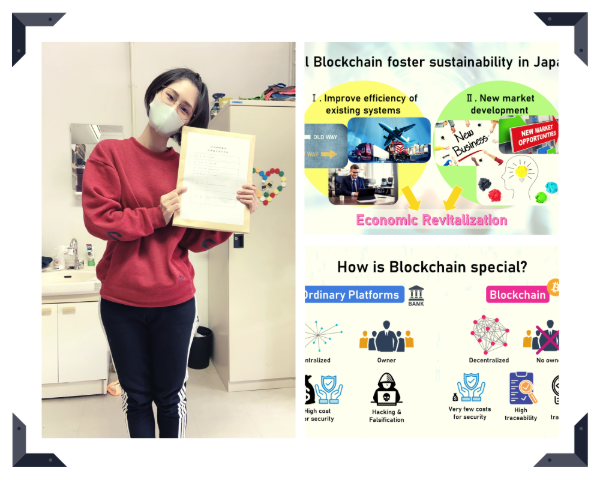
CN: "After graduating from university, I believe that the self-management skills such as motivation and planning that I developed through working on my thesis will surely become the bread and butter of my life."
Next, I spoke with RN. Her topic was challenging for those of us who enjoy eating meat, but the way she spoke about this at the conference was informative, non-judging, and really engaging. I know from feedback from guests that many have thought a lot about their own diets as a result of her presentation.
(三人目は、食肉にまつわる問題を研究したC.N.さんです。彼女の研究内容は、私たちの食生活を改めて見直す機会を与えてくれるものです。)
My thesis is about the meat industry in Japan. I especially focused on the problem of animal welfare, but also mentioned issues including the environment and human health that result from modern meat production methods. Through this research, I tried to understand the causes of these problems, and find better ways to solve them. By learning about this topic, I realized that all of my actions and have an impact. The problems related to meat production are complicated since they are related to not only animal welfare but also many other issues besides. So, there were more things to write about and understand than I expected. It was tough, but at the same time, I could learn various things so I could improve myself. It was a challenge for me to summarize a difficult topic and find effective solutions, but with that challenge came the joy of new ideas and information. I could meet wonderful friends and teachers and learn a lot of things through the GSE course. Also, I was able to find something that I really want to do in the future. A lot has happened to me while I have been at university, but it has been the best time of my life. After graduating from this university, I intend to keep learning and keep pursuing my dreams.
(私の卒業論文のテーマは「日本の食肉生産の問題」についてです。主に食肉生産によっておこる動物福祉の問題について重点をおき、環境問題、健康問題にもふれつつ解決策を模索するものです。このテーマを研究してみて、自分が普段何気なく行ったいることが何かしらの形になってどこかに影響しているんだなと感じるようになりました。食肉生産の問題は、動物福祉だけでなくいろいろな社会問題と深くかかわっているので、思った以上に書くことが膨大になってしまって大変でしたが、同時にたくさんのことが研究できたので自分自身の成長を感じました。難しい問題の内容をまとめ、解決策を見つけ出すという作業は長く、大変なものでした。同時にいろいろなこを知ることができたのは非常にためになることでもあり、楽しかったです。またGSEの仲間や先生との出会い、様々なことを勉強し、本当に自分が何をしたいのか見つけることができたということが私の大学生活一番の宝物です。いろいろあったけど本当に楽しい大学生活でした!卒業してからも広い視野を持ち続け、自分の夢を実現させます!)
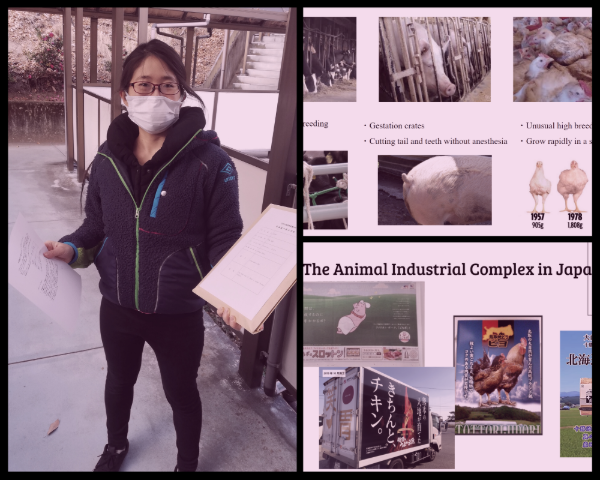
RN: "I was able to find something that I really want to do in the future"-for many students the thesis project leads to them forming new goals and dreams for the future. RN is now arranging for some work experience to learn more about sustainable living and agriculture.
(卒業研究が新たな目標や夢を持つきっかけになることがあります。R.N.さんは今、人々の暮らしと農業について実践的に学ぶ計画を立てています。)
Last, but certainly not least, we hear from MO. Just like MI, she is planning to become a teacher after graduating from HJU, but has decided to stay with us for a while to undertake graduate studies. Her presentation struck a chord with the teachers in the audience, and we could all see her enthusiasm for understanding more about learning!
(最後に紹介するM.Oさんは教育について研究し、その内容に対し、卒業研究発表会の聴衆の教員からも共感の声が上がりました。彼女もまた教師を志望していますが、大学卒業後は本学大学院に進学する予定です。)
My thesis topic is "English language invasion and English education in Japan". Language invasions, especially involving the English language, have been occurring in a lot of developed countries. For example, when I traveled to Germany in 2019 to study German, I encountered some examples. Most young people in Germany tend to prefer listening to English songs rather than German songs, most people think that speaking English is cool, and think people unsophisticated if they only can speak German. Nowadays, more and more children younger than 2 years old are learning English in Japan, and the demand for English private conversation schools, from both children and adults, has been increasing. Reflecting these phenomena, MEXT established English education as a compulsory subject at elementary school. Therefore, I thought these trends show that there is a chance that linguistic imperialism might be occurring in Japan too, and I decided to focus on compulsory education because that educational opportunity is accessed by all children. However, through my research, I found that the Critical Period Hypothesis (a theory that says there is an especially important period when a child learns languages) shows that there is less influence from this move by MEXT than expected. This is because it is said that this period ends when a child is 6 years old, whereas English education in elementary school starts from 4th grade (when students are 10 years old). However, different researchers think the period might continue until children are 12 or even 15, so this is an ongoing question. This issue is about neural perception, and each student has different features, meaning it is impossible to find some 'final answer'. Therefore, I suggest a new evaluation method based on 5 different perception types, to allow better study of English. An important part is decongesting the current curriculum to allow space for this. Because my research is broad and includes various topics, I had to choose the information I gather and write carefully. Therefore I suggest that future students choose a topic that is a little more specific and clear. In my case, sometimes I could not write my thesis because of teacher training, and I found it difficult at times to write and plan while being by myself at home. Therefore, it gave me such a sense of accomplishment when I finished writing my thesis. I spent 2 years conducting this research, and I learned a great deal about English education in Japan. The classes I have taken throughout the GSE course helped me a lot. I am going to be a high school teacher this April, and also I'll keep learning about English education when I join the HJU graduate school.
(私のトピックは「英語による言語侵略と日本における英語教育」です。言語侵略、特に英語による言語侵略は多くの先進国において問題視されつつあります。例えば、私が一昨年ドイツへ旅行に行った際、ドイツにおいて言語侵略の好例とも言える傾向があることを知りました。それはドイツ人の若者の多くはドイツ語の曲より英語の曲を聴くことが格好いいと考えており、また英語を流ちょうに話せることが格好よく、ドイツ語しか話せないのはださいと考えているという傾向でした。近年、日本では2才にも満たないような子どもたちが英語を学ぶケースが増えており、そして英会話教室の需要は、対象者の年齢層を問わず増加傾向にあります。このような傾向を反映してか、文部科学省は小学校に教科としての英語教育を導入しました。これらの現象から、私は英語による言語侵略が日本でも起きうるのではないかと考え、全ての子どもたちに接する機会が与えられている義務教育に着目することにしました。しかし調査を進めていくと、臨界期仮説(言語習得を効率よく行うことができるとされる時期)は一般的に6才で収束するとされており、小学校の英語教育は4年生、つまり10才から開始されるため、言語形成において深刻な影響を与える心配は少ないことが分かりました。これによって言語侵略は当初予想していたほど心配する必要はないと考えました。ただ臨界期仮説には諸説あり、12才から15才の間に収束するという説もあります。このような発達に関する問題にはこれといった正解がありません。そのため私は、年を追うごとに増えていく教育内容をこなし、かつ英語を効率的に学習するために、5つの受容スタイルに合わせた新しい評価方法を提案しました。私のトピックはとても範囲が広く、どこまで調べ、書くかという取捨選択が難しかったです。したがってトピックはある程度絞った方が書きやすく、また調べやすいと言えます。私の場合、教育実習などで卒論が書けない時間があったり、自宅での作業は自分との戦いで、思い通りに進まないこともありました。やりきった時は達成感がありました。私は約2年かけて書き上げ、日本における英語教育に関する知識や発見を多く得ることが出来ました。またこれを書き上げる中で、GSEのコースの授業で得た知識が多く役立ちました。4月から高校の英語教員として働きますが、大学院でも引き続き英語教育について研究していきます。)
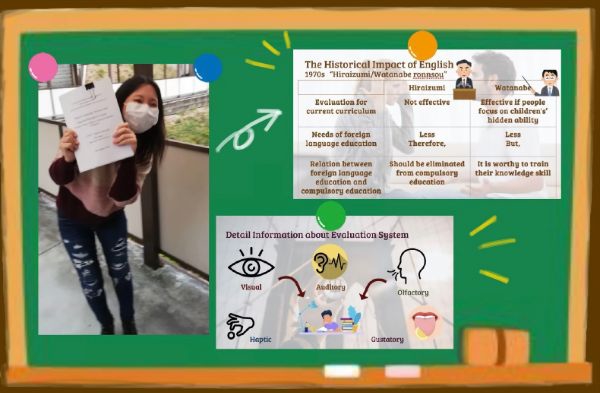
MO with her finished thesis: "it gave me such a sense of accomplishment when I finished writing my thesis".
To wrap things up, I asked the 4th year students to give some advice to their juniors. There were some really good and practical ideas, about topic choice, time-management, goal-setting, resisting the urge to compare yourself to others, and having confidence. As I say to their students often, the fact that they have finished a project over two years proves that they have the organizational skills, commitment, and tenacity to stick to medium and longer-term goals. From education and jobs to personal relationships and private goals, knowing you've got what it takes to create and stick to a plan will help you be a success. Here's a summary of their top tips for students undertaking their own thesis projects.
(今回、GSEの4年生からアドバイスをもらいました。トピックの選び方、時間管理の方法、スケジュールの立て方、他人と比べて落ち込まないこと、自信を持つことなど、どれもとても役に立つ、実践的なアドバイスでした。私もよく生徒たちに言っていたことですが、2年越しのプロジェクトを成し遂げたという事実そのものが、中・長期的な目標に対する自己管理能力、主体的にものごとを行う力、粘り強さを身につける事が出来たということを表しているのです。教育や仕事から人間関係や個人的な目標まで、多岐において計画を立て、それを実践するために何が必要なのかを知っていることは、必ず成功を収める手助けになるでしょう。)
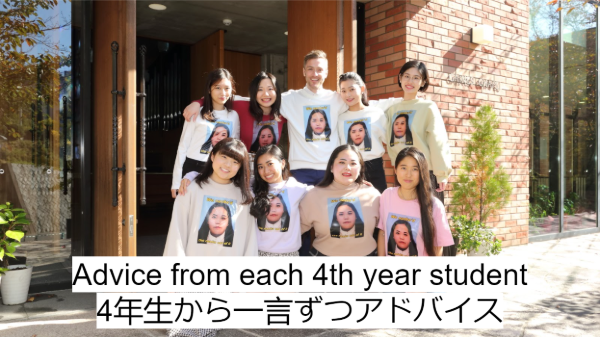
TK: "Choose a topic you can work on with passion and enthusiasm."
MO: "Don't underestimate the time you'll need each week, especially if you're taking the teaching license!"
AM: "Set realistic targets, and stick to them!"
CN: "Making time is the key to writing a convincing thesis!"
NM: "Write your citations and references as you go, don't leave them to the end!"
MI: "Be confident, everything you've done until now at HJU has been preparing you to do this!"
MK: "Don't compare yourself to others, classmates are a source of support, not of competition!"
RN: "Step by step, little by little, make progress!"
Well, I think that wonderful advice is a great place to end. Thank you for reading, and thank you to the 4th year GSE for their interesting reports. Finally, congratulations to students throughout the university for finishing their theses! Well done."
(改めて、GSEの4年生のみならず、すべてのHJU卒業生たちへ。
よく頑張りました、そしてお疲れ様でした。)
